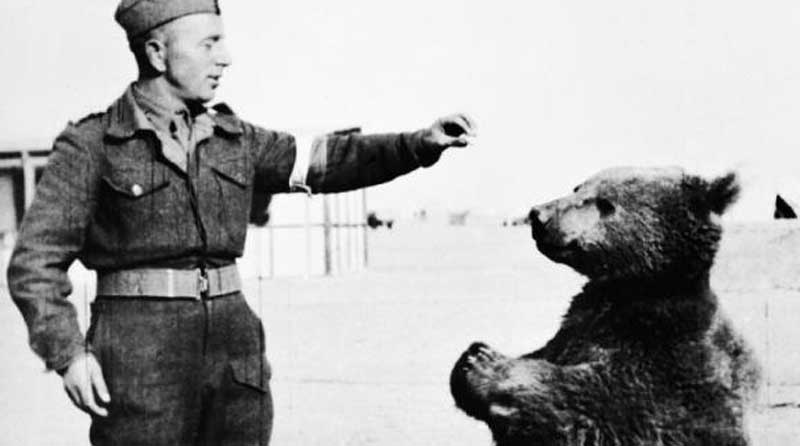The story of Wojtek is one of the most extraordinary tales of World War II. A small bear, adopted by the Polish soldiers of Anders’ Army, quickly became their friend and comrade-in-arms. He accompanied them on their military journey from Iran to Italy, where, among other things, he helped carry crates of ammunition. The heroic bear became a symbol not only of courage and friendship, but also of the fate of Polish soldiers who fought alongside the Allies, unable to return to their homeland, which was enslaved by the communists
Wojtek’s story begins in 1942, when a local boy found a tiny bear in the Hamadan mountains of Iran. Shortly thereafter, on the road to Kandawar, he came across Polish soldiers of 2nd Polish Corps under the command of General Władysław Anders, who, wanting to help the poor child, bought back a mysterious package from him for a few cans of food. The Poles were very surprised to see the contents of the moving and squeaking bundle, but quickly decided to adopt the bear. Corporal Piotr Prendyn decided to name him “Wojtek.”
Polish soldiers took the task of caring for their new comrade seriously. They immediately found a vodka bottle for him, from which he drank condensed milk. In addition, he ate fruit, marmalade and honey, but what he liked best was beer, which members of the 2nd Corps did not fail to treat him with.
The Poles quickly became close friends with the curious bear. Wojtek often cuddled up to sleeping soldiers, played with them, and when he grew older – he practiced wrestling with them. The defeated bear’s opponent had to wait patiently for the bear to get off his back and stop licking him. The bear became friendlier and friendlier, and happened to playfully tease random people to play with them (but mostly they were too scared to do so). For the Polish soldiers, their furry best friend became a kind of respite from the everyday life of war and a companion for their wandering through the Middle East.

Source: Imperial War Museum, Public Domain
When Wojtek grew so big that the soldiers could no longer feed him from their rations, he was drafted with the rank of private, so he received a daily load of fruit, marmalade and sweet syrups. Thus began the military career of our heroic bear – Wojtek walked the entire combat route of the 2nd Corps, from Iran, through Egypt to Italy. He often stood guard with the soldiers, or guarded the Corps’ cars – preferably sitting inside, but he soon stopped fitting in there. It is said that Wojtek once even caught an Arab spy he found in a bathhouse.

Source: Cassubia1238, Wikimedia Commons
He was particularly famous during the famous Battle of Monte Cassino, where he sacrificially carried heavy crates of ammunition despite the turmoil of battle and the danger to his life – and is said to have never dropped one. The image of Wojtek carrying an artillery shell was immortalized on the banner of the 22nd Transport Company of the Second Polish Corps, where he himself served. This badge was worn on uniforms and painted on the Corps’ trucks. Our brave bear still took part in capturing the port of Ancona, breaking through the Apennine fortifications and entering Bologna. For his dedicated service, Wojtek received the rank of corporal.
When World War II came to an end, the 22nd Company was relocated to Glasgow, Scotland. The local population immediately went crazy for Wojtek, who quickly became the hero of many press publications across the country. The bear even became a member of the local Polish-Scottish Society, where he was gifted with his favorite beer during a reception ceremony. It’s safe to say that the heroic bear had celebrity status in the Islands.

Photo: M J Richardson
Unfortunately for the army, it was the time of demobilization and Wojtek’s unit was disbanded. He was quickly found refuge at the Edinburgh Zoo, whose director agreed not to give Wojtek to anyone without the knowledge of company commander Major Antoni Chełkowski. His former army colleagues often came there to visit him, and not infrequently (despite the protests of Zoo staff) jumped the fence to wrestle with Wojtek again.
Wojtek the bear died at the zoo in December 1963, at the age of 21. His remarkable life became part of the history of the Polish soldier, and he made a major contribution to promoting our history in the West. In honor of the heroic bear, more than a dozen monuments have been erected in Europe, several musical pieces have been written, and this film, among others, has been made:



